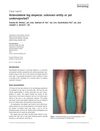 28 citations,
January 2018 in “Biochemical Society Transactions”
28 citations,
January 2018 in “Biochemical Society Transactions” Certain fats in the skin help control inflammation and health, and changing these fats through diet or supplements might treat skin inflammation.
 110 citations,
July 2017 in “Immunology”
110 citations,
July 2017 in “Immunology” Skin's Regulatory T cells are crucial for maintaining skin health and could be targeted to treat immune-related skin diseases and cancer.
 18 citations,
June 1995 in “International Journal of Dermatology”
18 citations,
June 1995 in “International Journal of Dermatology” Women experience various skin issues at different life stages, requiring careful treatment and awareness.
 21 citations,
January 2016 in “Skin appendage disorders”
21 citations,
January 2016 in “Skin appendage disorders” Alfredo Rebora suggested a new, easier way to classify hair loss in Telogen Effluvium, adding a type possibly related to autoimmune diseases.
 September 2018 in “International Journal of Dermatology”
September 2018 in “International Journal of Dermatology” Anterolateral leg alopecia is a benign, nonprogressive hair loss condition on the lower legs that is not well understood and may resolve on its own.
 November 2022 in “Skin health and disease”
November 2022 in “Skin health and disease” People with hair loss conditions often have more mental health issues like depression and anxiety compared to those without hair loss.
 1 citations,
June 2012 in “Actas Dermo-Sifiliográficas”
1 citations,
June 2012 in “Actas Dermo-Sifiliográficas” Early and aggressive treatment of scarring alopecia is important to prevent further hair follicle damage.
 3 citations,
June 2020 in “Cutis”
3 citations,
June 2020 in “Cutis” Poor nutrition can lead to skin diseases in hospitalized patients and should be quickly identified and treated.
 7 citations,
January 2013 in “Journal of Investigative Dermatology”
7 citations,
January 2013 in “Journal of Investigative Dermatology” Vitamin A may influence hair loss conditions like alopecia, but more research is needed to understand how.
 July 2003 in “Journal of Cutaneous Medicine and Surgery”
July 2003 in “Journal of Cutaneous Medicine and Surgery” Various skin conditions like cutaneous lupus erythematosus, psoriasis, and basal cell carcinoma can be effectively treated with antihypertensive agents, NB-UVB phototherapy, and imiquimod cream respectively. Vaccines are effective against genital herpes and HPV-16 infection. Early intervention is crucial for conditions like diabetic foot ulcers and neonatal herpes. Certain dyes can cause hand dermatitis, and there's a link between smoking/drinking and psoriasis in men. No direct link was found between low iron levels and chronic hair loss in women.
 2 citations,
September 2015 in “Clínica e Investigación en Arteriosclerosis”
2 citations,
September 2015 in “Clínica e Investigación en Arteriosclerosis” Some skin conditions may increase the risk of heart disease, but are not yet included in cardiovascular prevention guidelines.
 6 citations,
March 2009 in “Journal of the European Academy of Dermatology and Venereology”
6 citations,
March 2009 in “Journal of the European Academy of Dermatology and Venereology” Mexican patients had a lower incidence of skin reactions to drugs and no significant link between these reactions and the TNF2 gene variant.
 2 citations,
January 2014 in “Springer eBooks”
2 citations,
January 2014 in “Springer eBooks” The book details skin conditions in older adults, their link to mental health, cancer treatment importance, hair loss remedies, and managing autoimmune and itchy skin.
 November 2022 in “Journal of Education, Health and Sport”
November 2022 in “Journal of Education, Health and Sport” The skin's bacteria might influence the development of a hair loss condition called alopecia areata.
 421 citations,
April 2012 in “The New England Journal of Medicine”
421 citations,
April 2012 in “The New England Journal of Medicine” Alopecia Areata is an autoimmune condition causing hair loss with no cure and treatments that often don't work well.
 July 2003 in “Journal of Cutaneous Medicine and Surgery”
July 2003 in “Journal of Cutaneous Medicine and Surgery” Various skin conditions can be treated effectively with different methods, such as discontinuing certain drugs, using specific vaccines, applying creams, and changing lifestyle habits like smoking and drinking.
 January 2021 in “International journal of medical science and health research”
January 2021 in “International journal of medical science and health research” A patient with sickle cell trait and low vitamin D might have lupus, a rare combination that needs more attention.
21 citations,
April 2019 in “Journal of cutaneous pathology” People with alopecia areata have fewer regulatory T-cells than those with other skin conditions.
 8 citations,
February 2022 in “Vascular Health and Risk Management”
8 citations,
February 2022 in “Vascular Health and Risk Management” Some skin conditions may increase the risk of heart disease, and understanding their connection could lead to better treatments.
 9 citations,
January 2017 in “Elsevier eBooks”
9 citations,
January 2017 in “Elsevier eBooks” Skin's epithelial stem cells are crucial for repair and maintenance, and understanding them could improve treatments for skin problems.
 2 citations,
February 2021 in “The Journal of clinical and aesthetic dermatology”
2 citations,
February 2021 in “The Journal of clinical and aesthetic dermatology” Understanding the cause of bitemporal hair loss is key to deciding the right treatment.
15 citations,
January 2022 in “Immune Network/Immune network” New targeted immunotherapies are improving treatment for inflammatory skin diseases.
 15 citations,
January 2018 in “Acta dermato-venereologica”
15 citations,
January 2018 in “Acta dermato-venereologica” Skin treatment can lower life quality for patients with skin conditions.
 14 citations,
January 2017 in “Elsevier eBooks”
14 citations,
January 2017 in “Elsevier eBooks” CBG may help with various medical conditions but needs more human research to confirm safety and effectiveness.
 3 citations,
August 2022 in “Cutis”
3 citations,
August 2022 in “Cutis” Certain nail conditions can suggest thyroid problems, with different symptoms for underactive (slow, thin nails) and overactive (spoon-shaped, brittle nails) thyroid.
 60 citations,
January 2014 in “Anais Brasileiros De Dermatologia”
60 citations,
January 2014 in “Anais Brasileiros De Dermatologia” Nanotechnology in dermatology shows promise for better drug delivery and treatment effectiveness but requires more safety research.
 1 citations,
August 2021 in “Movement disorders clinical practice”
1 citations,
August 2021 in “Movement disorders clinical practice” A man with Isaac's syndrome affecting only one side of his body improved after immune system-targeted treatment.
 1 citations,
April 2016 in “CRC Press eBooks”
1 citations,
April 2016 in “CRC Press eBooks” Skin aging reflects overall body aging and can indicate internal health conditions.
 21 citations,
September 2018 in “International journal of women’s dermatology”
21 citations,
September 2018 in “International journal of women’s dermatology” People with Lichen planopilaris are more likely to have certain autoimmune and endocrine disorders but less likely to have conditions like allergies and diabetes.
 July 2011 in “British Journal of Dermatology”
July 2011 in “British Journal of Dermatology” Dermatologists give better information on pathology forms, hypersensitivity vasculitis is a common skin issue, misdiagnoses can occur, and various skin conditions are linked to loss of elastin or genetic factors.




























